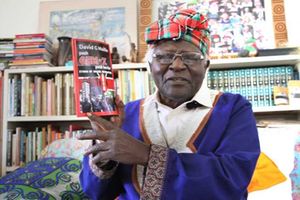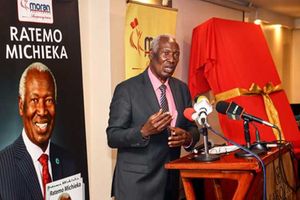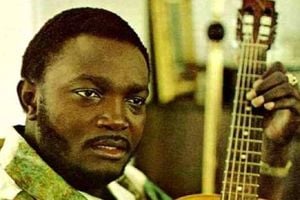
Victoria's bold fashion statement complements her vibrant music, making her a standout figure on and off the stage. In this interview, she reveals how her Christian upbringing continues to shape her art, and how her Kenyan heritage and international experiences influence her unique sound.

1. What inspires your music and how do you write your songs?
I draw my inspiration from my own experiences and those of other people. My creative process is quite spontaneous. I like to be in the studio and have jam sessions with other musicians, and produce music on the spot. I also like listening to instrumentals and just yielding to the mood of the moment.
Most times my song writing process isn’t pre-planned. I could just be out doing something and an idea comes to my head, so I record a voice note.
If I’m doing a collaboration and we are in different countries, my collaborators and I record each part and then send it to each other on email, and then the engineers put it together and make a song. But I prefer being together with my partners in the studio and working on the project jointly.

2. Your music beautifully blends different cultural elements. How do your Kenyan roots and international experiences influence your music?
I am Kenyan, but of a unique type because I was born and raised in the US. I moved back to Kenya in 2013 so my outlook is a little different from that of my other siblings who were born and raised here. Even though we have slight differences, I try to incorporate my Kenyan culture into my music. My upcoming album cover was shot in Lamu. In my work, I try as much as I can to show that I didn't grow up in privilege, I just understand things differently and I appreciate the country’s beauty even more.
I see Kenya as very colourful, vibrant and extremely beautiful. I am a nature lover so even showing landscape in my music means a lot to me. I also make sure I use Swahili words in my songs. Kenya is a melting pot and I find Kenyans to be very diverse people.

3. You have quite a unique fashion style, how have the American and Kenyan cultures influenced it?
My mum was very flashy. How she dresses is very reflective of her perspective as an African woman in America. You know how flashy Africans can be if they want to. My mum always wanted to look smart, whether she was picking me up from school, going to church or even grocery shopping, so I think that’s where my bold and unapologetic side of fashion comes from. Also I didn’t have to wear school uniforms, so most times I got to choose what to wear to school. No one dictated that for me.
With that background, I can express myself through what I wear. I have never felt the pressure to wear the same thing everyone else has on.

4. How does your Christian background affect the type of music you write or sing?
I started by writing songs for other artists in the US. Nobody cared whether we were making Christians or secular songs, in the studio the producers just wanted us to make good hits. There were no restrictions. I do believe in God and that He is in control of everything, and my fifth album, I felt like I needed to put some lyrics that would uplift and empower people, and let them know that my talent is from God.
There will be a gospel record on my upcoming project but even the other songs, I still recognise God. I was keen about that. Coming from a Christian family, despite doing pop music, I felt I had the responsibility to avoid dragging people into the gutter or leading them towards destructive things. I also did a gospel EP with five songs and sent it to my parents and they are excited about it. For the first time they are involved in my music and they want me to release it. I don't think I have had their support in my other projects.
5. You’ve worked with many artists across various genres. Which collaboration has been the most memorable for you, and why?
About eight years ago, I did a song with Ferre Gola titled Tucheze after he visited Kenya. Seven years later, in June 2023, Ferre had a concert at one of the biggest stadiums in Congo (Stade des Martyrs), and he insisted I perform. He said the song Tucheze helped revive his music career after a hiatus. That was my first time performing in Kinshasa, and I was blown away by their love for music. It was the biggest crowd I’ve ever performed for, and the support was overwhelming. It was a life-changing experience. So, Ferre Gola is definitely my most memorable collabo.










